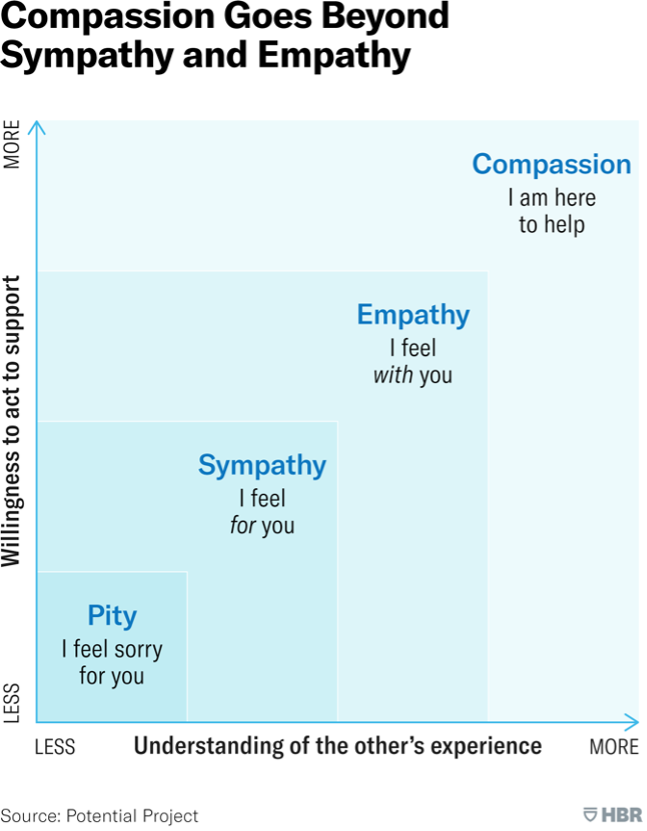
We recently came across this visual initially published through the Harvard Business Review – an engaging graphic depicting how and why compassion goes beyond sympathy and empathy by taking into consideration one’s willingness to act and support, along with their understanding of the other person’s experience.

According to the visual, sympathy involves recognising and expressing pity or concern, but it may not necessarily involve a deep understanding of the other person’s experience. It is often characterised by an emotional response to someone else’s difficulty.
Empathy, on the other hand, is said to go beyond sympathy as it involves the ability to understand and share the feelings and experiences of somebody else. It requires putting oneself in the shoes of the other person and trying to grasp their perspective and emotions. Empathy involves connecting with others on an emotional level, acknowledging their feelings and demonstrating understanding and support.
Compassion is said to take empathy a step further by not only understanding and sharing the feelings of another person, but also involving a genuine concern for the well-being of others and a willingness to actively help and support them. It goes beyond feeling and understanding to actively engaging in acts of support.
The HBR graphic emphasises that while sympathy and empathy are important, compassion is the key to making a real difference. It highlights the need for individuals to move beyond simply acknowledging or understanding someone’s situation and instead take proactive steps to alleviate their difficulty.
From our experience, compassion also plays a transformative role in the mediation process, which is probably why the HBR visual resonated with us so strongly.
Compassion sets the foundation for a safe and supportive environment in mediation.
When the parties involved in the mediation feel that the mediator genuinely cares about their well-being, they are more likely to open up express their concerns and engage in productive dialogue. Compassion cultivates trust, reduces defensiveness, and encourages participants to be vulnerable and share their experiences openly.
Compassion also helps mediators develop a deep understanding of the parties involved, their emotions, and their underlying needs and wishes.
By actively listening to each participant, the mediator gains insights into their perspectives, experiences, and motivations. This understanding allows the mediator to bridge gaps between the parties and promote a more comprehensive dialogue that goes beyond surface-level positions.
Active listening enables mediators to grasp the nuances of the parties’ concerns and identify shared interests. It also empowers participants to feel heard, validated, and understood, leading to a greater willingness to explore mutually beneficial solutions.
Compassionate mediators strike a delicate balance between assertiveness and sensitivity. While maintaining a structured process, they are attuned to the emotional needs of the parties involved. Compassion allows mediators to address conflict with sensitivity, ensuring that the parties feel respected, validated, and supported. At the same time, compassionate mediators are assertive in facilitating difficult conversations, addressing power imbalances, and maintaining a constructive atmosphere.
Compassion fosters a collaborative approach in mediation, focusing on joint problem solving rather than winners and losers.
Compassionate mediators guide participants towards recognising their shared goals and interests, emphasising the benefits of collaboration. By demonstrating compassion, mediators inspire the parties to look beyond their individual positions to seek win-win solutions that address the needs of everyone involved.
Conflict can often evoke strong emotions, which can hinder effective communication and resolution. Compassionate mediators are skilled in managing emotional dynamics during the mediation process by creating a space where emotions can be acknowledged and expressed without judgement. By demonstrating compassion towards the emotions of the parties involved, mediators help to diffuse tension, build rapport, and enable parties to engage in more constructive dialogue.
Compassion allows participants to express their frustrations and concerns, leading to a sense of validation and relief. Through compassionate guidance, mediators help the parties reach a resolution that ideally restores the relationship and provides a sense of closure.
Compassion plays a vital role when it comes to successful mediation by helping to create a safe and supportive environment, managing emotional dynamics, and ultimately bringing about long-term transformation.
Mediators who embody compassion in their practice enhance the effectiveness of the mediation process, helping parties navigate conflict with respect and a genuine desire to alleviate unnecessary stress and anxiety. By embracing compassion, mediation becomes a powerful tool for conflict resolution and the cultivation of harmonious relationships.
Our process is designed to empower you to address your challenges by facilitating discussion, exploring the conflict in depth from other perspectives, and seeking to reach a personalised solution that has considered various outcomes and consequences.
ABN: 79 669 530 321